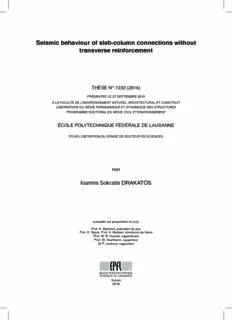
Seismic behaviour of slab-column connections without transverse reinforcement PDF
Preview Seismic behaviour of slab-column connections without transverse reinforcement
Seismic behaviour of slab-column connections without transverse reinforcement THÈSE NO 7232 (2016) PRÉSENTÉE LE 27 SEPTEMBRE 2016 À LA FACULTÉ DE L'ENVIRONNEMENT NATUREL, ARCHITECTURAL ET CONSTRUIT LABORATOIRE DU GÉNIE PARASISMIQUE ET DYNAMIQUE DES STRUCTURES PROGRAMME DOCTORAL EN GÉNIE CIVIL ET ENVIRONNEMENT ÉCOLE POLYTECHNIQUE FÉDÉRALE DE LAUSANNE POUR L'OBTENTION DU GRADE DE DOCTEUR ÈS SCIENCES PAR Ioannis Sokratis DRAKATOS acceptée sur proposition du jury: Prof. A. Martinoli, président du jury Prof. K. Beyer, Prof. A. Muttoni, directeurs de thèse Prof. M. B. Hueste, rapporteuse Prof. W. Kaufmann, rapporteur Dr P. Lestuzzi, rapporteur Suisse 2016 Foreword The gravity load resisting system of mid- to high-rise buildings that are braced by reinforced concrete (RC) walls consists often of slender RC columns and flat RC slabs. This system has a low horizontal stiffness and does not contribute significantly to the horizontal stiffness of the building. However, to avoid premature failure under seismic loading, it is necessary that the gravity load resisting system is able to accommodate the lateral displacements that the horizontal loading evokes. A common pre- mature failure mode of slab-column connection is the brittle punching shear failure. To avoid this failure mode, the designer needs to estimate the deformation capacity of the slab-column connection under seismically induced deformations and compare it to the demand. Current codes predict the deformation capacity of slab-column connections by means of empirical models. Ioannis Drakatos develops models for predicting the strength and the deformation capacity of slab- column connections under seismic loading. The focus of his work is on the effect of cyclic loading on the deformation capacity. To investigate this effect experimentally, he tested 13 full-scale isolated slab-columnconnectionswithoutshearreinforcement. Thetestseriesallowedtocomparetheresponse ofmonotonicallyandcyclicallyloadedslabsfordifferentgravityshearratiosandreinforcementratios. Ioannis Drakatos then extends the model of the Critical Shear Crack Theory for slab-column connec- tions subjected to seismic loading, considering the monotonic load case and the cyclic load case. The modelwasvalidatedagainsttheowntestsaswellastestspublishedintheliterature. Thecomparison shows a very good performance. The thesis concludes with the proposal of an effective beam width methodthatallowsestimatingthedeformationdemandonslab-columnconnectionsfromelasticfinite element analysis. The project was financially supported through a grant of the Swiss National Science Foundation and a grant of the cemsuisse foundation (association of the Swiss cement producers), which are both acknowledged. Lausanne, September 2016 Prof. Dr. Katrin Beyer Prof. Dr. Aurelio Muttoni iii Funding The author gratefully acknowledges the support of the Swiss National Science Foundation for the supportoftheexperimentalcampaign(GrantNo143747)andtheSwissCementIndustry(CemSuisse) for the support of the theoretical investigations (No 201201). v Στους γονείς μου Χρυσούλα και Διονύσιο, ως ελάχιστη ένδειξη ευγνωμοσύνης για όσα μου προσέφεραν, για όσα δε μου προσέφεραν, αλλά κυρίως γιατί μου δίδαξαν, με τη στάση ζωής τους, ότι ο σεβασμός της συνείδησης οδηγεί στην πραγματική ευτυχία, και οποιαδήποτε ασυνείδητη συμπεριφορά δεν παρερμηνεύε- ται ούτε παραγράφεται, σε αντίθεση με τις περισσότερες έκνομες συμπεριφορές. “αὑτὸν ἄρα νοεῖ (ὁ νοῦς), εἴπερ ἐστὶ τὸ κράτιστον, καὶ ἔστιν ἡ νόησις νοήσεως νόησις.” ᾿Αριστοτέλης (Μετὰ τὰ Φυσικά, 1074β.15–1075α.10) Translation “therefore (mind) thinks itself, if it is the most excellent thing, and its thinking is a thinking of thinking.” Aristotle (Metaphysics, 1074b.15–1075a.10)
Description: